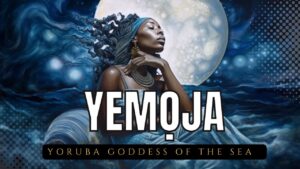In Yoruba mythology, the goddess Yemọja is revered for her strength and beauty. As a symbol of the sea, motherhood, and fertility, she is typically represented as a lovely queen in blue and white who wears a crown and has long, loose-curling hair.
Yemja is the Yoruba goddess of creation and the purported mother of the 14 principal deities of Yoruba mythology. She is sought for for her expertise in concerns of conception, childbirth, and family harmony, and she is known as a defender of children and women.
Yemja’s affinity for the sea is a central theme in many of the stories told about her. Legend has it that she was originally a river goddess, but after marrying Olokun, the deity of the ocean, she was converted into the goddess of the sea. She is charged with ensuring the safety of all marine life, from fish and dolphins to sea turtles and whales.
Legend has it that praying to Yemja can help keep the seas peaceful and provide good fortune to mariners. She is also sought for for her healing powers, which she uses to alleviate pain and suffering.
Yemja is a deity revered by Yoruba people, and the festival Olojo is held each year to pay tribute to her. Celebrating the goddess’s dominion over the sea and the universe as a whole, this festival is held annually in the city of Ife.
Yemja is a powerful and influential deity, but she is also kind and caring. She is seen as a guardian and nurturer of all forms of life, hence she is frequently shown holding a newborn or surrounded by children.
Yemja, the Yoruba goddess of the sea, fertility, and motherhood, is a strong and popular figure in the religion’s mythology. Her story is still told and spoken again, and her impact on Yoruba culture and tradition is clear in many ways. Yemja has a long and storied history in mythology and folklore, whether she is being used to represent motherhood, fertility, or the great might of the ocean.






